
awesome-gpt-prompt-engineering
A curated list of awesome resources, tools, and other shiny things for GPT prompt engineering.
Stars: 802
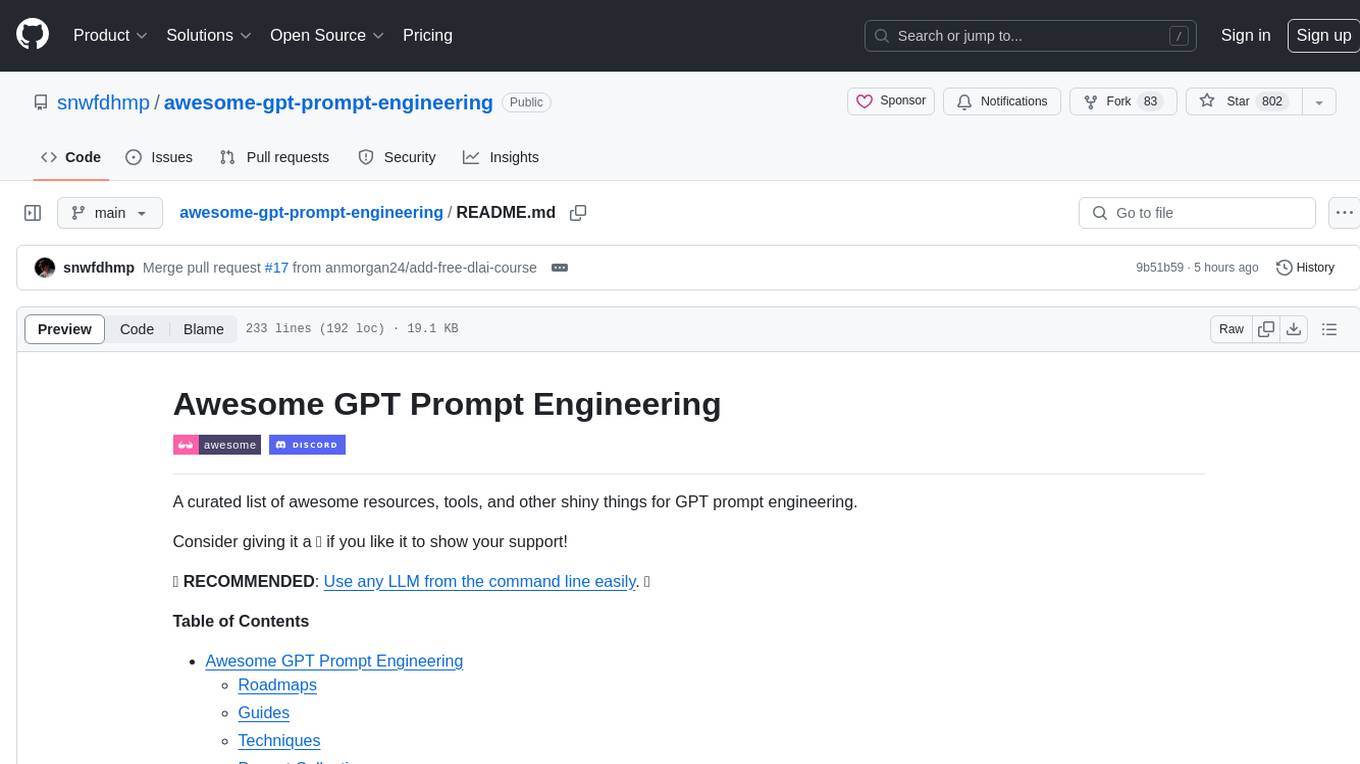
Awesome GPT Prompt Engineering is a curated list of resources, tools, and shiny things for GPT prompt engineering. It includes roadmaps, guides, techniques, prompt collections, papers, books, communities, prompt generators, Auto-GPT related tools, prompt injection information, ChatGPT plug-ins, prompt engineering job offers, and AI links directories. The repository aims to provide a comprehensive guide for prompt engineering enthusiasts, covering various aspects of working with GPT models and improving communication with AI tools.
README:
A curated list of awesome resources, tools, and other shiny things for GPT prompt engineering.
Consider giving it a ⭐️ if you like it to show your support!
🚀 RECOMMENDED: Use any LLM from the command line easily. 🚀
Table of Contents
- Prompt Engineering Roadmap: Step by step guide to learning Prompt Engineering.

- Learn Prompt Engineering: Introduction to Prompt Engineering and Prompt Engineering techniques.
- Prompt Engineering Guide: Guides, papers, lecture, notebooks and resources for prompt engineering.
- Prompt Engineering 101: Prompt Engineering guide by Xavi.
- Prompt Engineering 101: Prompt Engineering guide by Raza Habib & Sinan Ozdemir.
- Prompt Engineering Guide: Prompt Engineering guide by Sudalai Rajkumar.
- How to generate text: using different decoding methods for language generation with Transformers: A guide to decoding methods for language generation with Transformers.
- The Illustrated Transformer: A visual guide to transformers, the core model used in GPT.
- Reddit's r/aipromptprogramming Tutorials Collection: A collection of tutorials for prompt engineering.
- Prompt Engineering Guide: A comprehensive guide that contains all the latest papers, learning resources, and developments in the field of prompt engineering.
- dair-ai/Prompt-Engineering-Guide: A GitHub repository that provides a prompt engineering guide with the latest papers and learning guides.
- How to Communicate with ChatGPT – A Guide to Prompt Engineering: A guide that explains what prompt engineering is and how you can use it to improve your communication with AI tools.
- A Beginner's Guide to ChatGPT Prompt Engineering: A beginner-friendly guide that delves into the art and science of Prompt Engineering.
- A Complete Introduction to Prompt Engineering for Large Language Models
- Prompt Engineering Guide: How to Engineer the Perfect Prompts
- Best practices for prompt engineering with OpenAI API: A guide by OpenAI that provides best practices for prompt engineering.
- ChatGPT Prompt Engineering for Developers: A short course on prompt engineering by deeplearning.ai.
- Natural Language Processing: Coursera specialization focusing on NLP.
- Learn Prompting: A Free, Open Source Course on Communicating with AI.
- Deep Learning Specialization: Coursera specialization by Andrew Ng, which includes a course on Sequence Models.
- OpenAI Cookbook: OpenAI's cookbook includes examples of prompt engineering.
- Tokens and Tokenization: Understanding Cost, Speed, and Limits with OpenAI's APIs: Everything tokens and tokenization. How to control costs/performance, how to handle Max Token limits, and a real-world example on how you can make your prompts more efficient.
- How OpenAI Parameters Actuallly Work: How to use OpenAI's parameters to experiment with prompts and get better outputs.
- A Beginner's Guide on Embeddings and Their Impact on Prompts: A Beginner's Guide on Embeddings and Their Impact on Prompts.
- Prompt Engineering for Vision Models: A beginner's guide to prompting vision models from DeepLearningAI.
- Few Shot Learning: Everything you need to know about Few-Shot Learning.
- Zero Shot Learning: Large Language Models are Zero-Shot Reasoners.
- Chain of Thought: Encourages the LLM to explain its reasoning to improve its accuracy.
- Zero Shot Chain of Thought: Enable Chain of Thought with only a few words.
- Tree of Thoughts: Tree of Thoughts: Deliberate Problem Solving. with Large Language Models.
- Multi Persona Collaboration: Prompt the LLM to dynamically generate personas to collaborate to solve a task.
- Mastering ChatGPT Prompts: Mastering ChatGPT Prompts: Harnessing Zero, One, and Few-Shot Learning, Fine-Tuning, and Embeddings for Enhanced GPT Performance.
- Prompting GPT-3 To Be Reliable: Prompting GPT-3 To Be Reliable.
- Decomposed Prompting: A Modular Approach for Solving Complex Tasks.
- AutoPrompt: Eliciting Knowledge from Language Models with Automatically Generated Prompts.
- LangChain Github Repository: Building applications with LLMs through composability.
- Embedchain Github Repository: Framework to create ChatGPT-like bots over your dataset.
- FlowGPT: FlowGPT is the largest open source prompt community.
- awesomegptprompts.com: Explore hundreds of the best ChatGPT Prompts.
- fka/awesome-chatgpt-prompts: Dataset of awesome chatgpt prompts.
- f/awesome-chatgpt-prompts: This repo includes ChatGPT prompt curation to use ChatGPT better. .
- Awesome ChatGPT Prompts
- PromptHub
- ShowGPT.co
- Best Data Science ChatGPT Prompts
- ChatGPT prompts uploaded by the FlowGPT community
- Ignacio Velásquez Prompt Templates: 500+ ChatGPT Prompt Templates.
- PromptPal: A collection of prompts for GPT-3 and other language models.
- Hero GPT: AI Prompt Library.
- Reddit's ChatGPT Prompts
- Snack Prompt: GPT prompts collection, has a a Chrome extension.
- ShareGPT: Share your prompts and your entire conversations.
- Prompt Search: a search engine for AI Prompts.
- PromptBase: The largest prompts marketplace on the web.
- The Ultimate 5 ChatGPT Prompts: Simplify Your AI Experience.
- The Prompt Index: A vast collection of carefully curated prompts, stimulating imagination and fueling creative endeavours.
- PromptDen: A growing list of thousands of prompts for both text and image generation. Free to explore, add your own, save your favorites and even create a profile page for prompt engineering.
- Attention Is All You Need: Transformer introduction paper.
- Language Models are Few-Shot Learners: GPT-3 introduction paper by OpenAI.
- Fine-Tuning Language Models from Human Preferences: Important paper on fine-tuning language models by OpenAI.
- The Power of Scale for Parameter-Efficient Prompt Tuning: Explores the benefits of "prompt tuning" for robust task performance.
- Deep Attentive Learning for Stock Movement Prediction From Social Media Text and Company Correlations: Introduces an architecture for accurate stock forecasting using financial data and social media signals.
- A Prompt Pattern Catalog to Enhance Prompt Engineering with ChatGPT
- Hard Prompts Made Easy: Gradient-Based Discrete Optimization for Prompt Tuning and Discovery.
- Synthetic Prompting: Generating Chain-of-Thought Demonstrations for Large Language Models.
- Progressive Prompts: Continual Learning for Language Models.
- Batch Prompting: Efficient Inference with LLM APIs.
- Successive Prompting for Decompleting Complex Questions
- Structured Prompting: Scaling In-Context Learning to 1,000 Examples.
- Large Language Models Are Human-Level Prompt Engineers
- Ask Me Anything: A simple strategy for prompting language models.
- PromptChainer: Chaining Large Language Model Prompts through Visual Programming.
- Reframing Instructional Prompts to GPTk's Language
- Prompt Programming for Large Language Models: Beyond the Few-Shot Paradigm.
- Prefix-Tuning: Optimizing Continuous Prompts for Generation
- Multimodal Chain-of-Thought Reasoning in Language Models
- On Second Thought, Let's Not Think Step by Step!: Bias and Toxicity in Zero-Shot Reasoning.
- ReAct: Synergizing Reasoning and Acting in Language Models
- Language Models Are Greedy Reasoners: A Systematic Formal Analysis of Chain-of-Thought.
- On the Advance of Making Language Models Better Reasoners
- Large Language Models are Zero-Shot Reasoners
- Reasoning Like Program Executors
- Self-Consistency Improves Chain of Thought Reasoning in Language Models
- Chain of Thought Prompting Elicits Reasoning in Large Language Models
- Generated Knowledge Prompting for Commonsense Reasoning
- Large Language Models Can Be Easily Distracted by Irrelevant Context
- Constitutional AI: Harmlessness from AI Feedback
- The ChatGPT Prompt Book: A book dedicated to ChatGPT prompts.
- You Look Like a Thing and I Love You: A book about AI with a focus on language models.
- OpenAI Discord Server: The official OpenAI Discord server.
- Attention Architects: Prompt Engineering expert & open source community.
- ChatGPT Prompt Engineering Discord Server: A Discord server dedicated to prompt engineering.
- Attention Architects: Prompt Engineering open source community.
- r/MachineLearning: The Machine Learning subreddit often has discussions on GPT and other language models.
- Hugging Face Forum: A forum for discussing Hugging Face's transformer models, including GPT.
- ChatGPT Community Discord Server: A Discord server dedicated to ChatGPT.
- Reddit's ChatGPT Discord Server: r/chatgpt Discord server.
- PromptsLab Discord: Knowledge sharing community for Generative Models, Prompt Engineering, LLMs.
- Learn Prompting: A Discord server dedicated to learning about prompts.
- Artificial Intelligence Discord: Discord server for AI enthusiasts and prompt engineers.
- Official OpenAI Playground
- llm: Use any LLM from the command line, easily.
- Nat.Dev: Multiple Chat AI Playground & Comparer.
- Poe.com: All in one playground: GPT4, Sage, Claude+, Dragonfly, and more...
- Ora.sh GPT-4 Chatbots
- Better ChatGPT: A web app with a better UI for exploring OpenAI's ChatGPT API.
- LMQL.AI: A programming language and platform for language models.
- Vercel Ai Playground: One prompt, multiple Models (including GPT-4).
- Conju.ai: A visual prompt chaining app.
- Voiceflow: Professional collaborative visual prompt-chaining tool.
- CometLLM: Track, visualize, and evaluate your LLM prompts and chains in one simple-to-use, convenient UI.
- Promptify: Automatically improve your prompt.
- Fusion: Elevate your output with Fusion's smart prompts.
- Bumble-Prompts: Let AI Write your bumble prompt.
- ChatGPT Prompt Generator: Generates ChatGPT prompts based on a BART model.
- PromptPerfect: Prompt optimizer.
- Hero GPT: AI Prompt Generator.
- LMQL: Query language for programming large language models.
- OpenPromptStudio
- BossGPT
- Auto-GPT Official Repo
- Auto-GPT God Mode
- OpenAIMaster's Guide to Auto-GPT: How does Auto-GPT work, an AI tool to create full projects.
- AgentGPT: GPT agents in browser.
- DemoGPT: 🧩 DemoGPT enables you to create quick demos by just using prompts.
- Understanding Prompt Injections and What You Can Do About Them: An introduction to prompt injections with examples and tactics you can use to mitigate potential risks in your application.
- Learn Prompting's Prompt Injection guide: A guide to prompt injections with examples.
- Prompt injection: What's the worst that can happen?
- Prompt injections are bad, mkay?
- ChatGPT plugins: OpenAI Official Page.
- Plug-in example code in Python: Example code for creating a ChatGPT plug-in in Python.
- Surfer Plug-in source code
- Security: (PAID) Create, deploy, monitor and secure LLM Plugins.
- Prompt-Talent: Prompt engineering job offers.
- llm: Use any LLM from the command line.
- FuturePedia: The Largest AI Tools Directory Updated Daily.
- Theresanaiforthat: The biggest AI aggregator.
- Awesome-Prompt-Engineering
- AiTreasureBox
- EwingYangs Awesome-open-gpt
- KennethanCeyer Awesome-llmops
- KennethanCeyer awesome-llm
- tensorchord Awesome-LLMOps
Contributions are always welcome! Please read the contribution guidelines first.
How to help:
- Give a ⭐️ to increase the repository's visibility.
- Add descriptions for resources that don't have them.
- Add new resources to the list.
- Fix typos or grammatical errors.
- Share this repository with others.
🚀 RECOMMENDED: Use any LLM from the command line easily with llm. 🚀
For Tasks:
Click tags to check more tools for each tasksFor Jobs:
Alternative AI tools for awesome-gpt-prompt-engineering
Similar Open Source Tools

awesome-gpt-prompt-engineering
Awesome GPT Prompt Engineering is a curated list of resources, tools, and shiny things for GPT prompt engineering. It includes roadmaps, guides, techniques, prompt collections, papers, books, communities, prompt generators, Auto-GPT related tools, prompt injection information, ChatGPT plug-ins, prompt engineering job offers, and AI links directories. The repository aims to provide a comprehensive guide for prompt engineering enthusiasts, covering various aspects of working with GPT models and improving communication with AI tools.
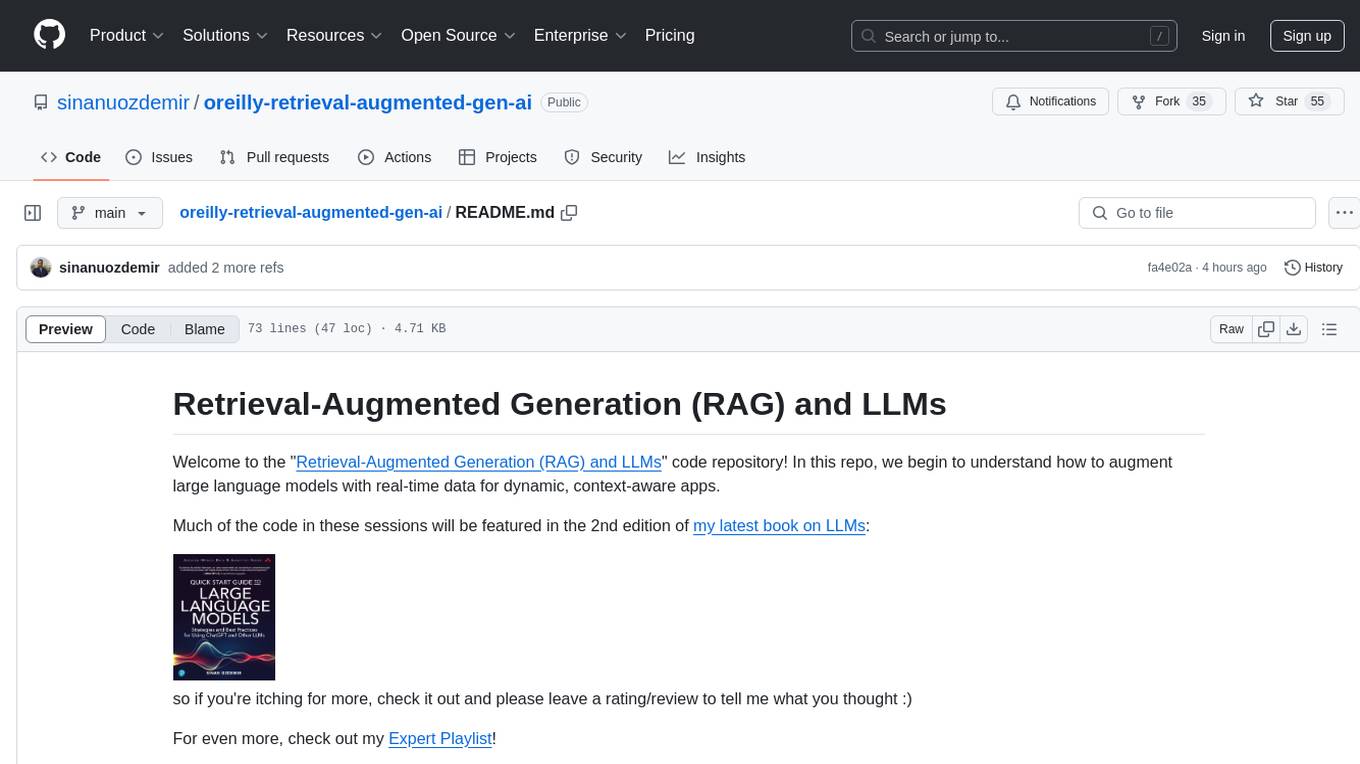
oreilly-retrieval-augmented-gen-ai
This repository focuses on Retrieval-Augmented Generation (RAG) and Large Language Models (LLMs). It provides code and resources to augment LLMs with real-time data for dynamic, context-aware applications. The content covers topics such as semantic search, fine-tuning embeddings, building RAG chatbots, evaluating LLMs, and using knowledge graphs in RAG. Prerequisites include Python skills, knowledge of machine learning and LLMs, and introductory experience with NLP and AI models.
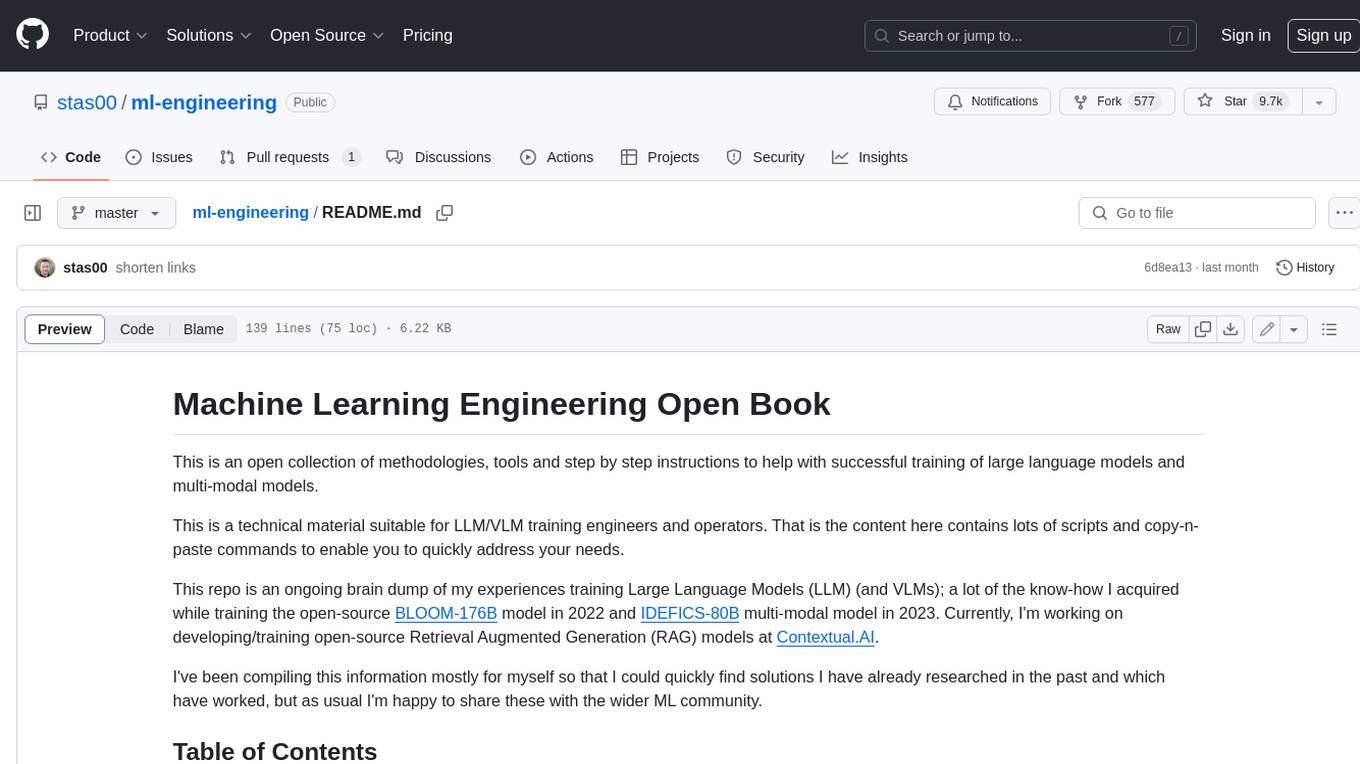
ml-engineering
This repository provides a comprehensive collection of methodologies, tools, and step-by-step instructions for successful training of large language models (LLMs) and multi-modal models. It is a technical resource suitable for LLM/VLM training engineers and operators, containing numerous scripts and copy-n-paste commands to facilitate quick problem-solving. The repository is an ongoing compilation of the author's experiences training BLOOM-176B and IDEFICS-80B models, and currently focuses on the development and training of Retrieval Augmented Generation (RAG) models at Contextual.AI. The content is organized into six parts: Insights, Hardware, Orchestration, Training, Development, and Miscellaneous. It includes key comparison tables for high-end accelerators and networks, as well as shortcuts to frequently needed tools and guides. The repository is open to contributions and discussions, and is licensed under Attribution-ShareAlike 4.0 International.
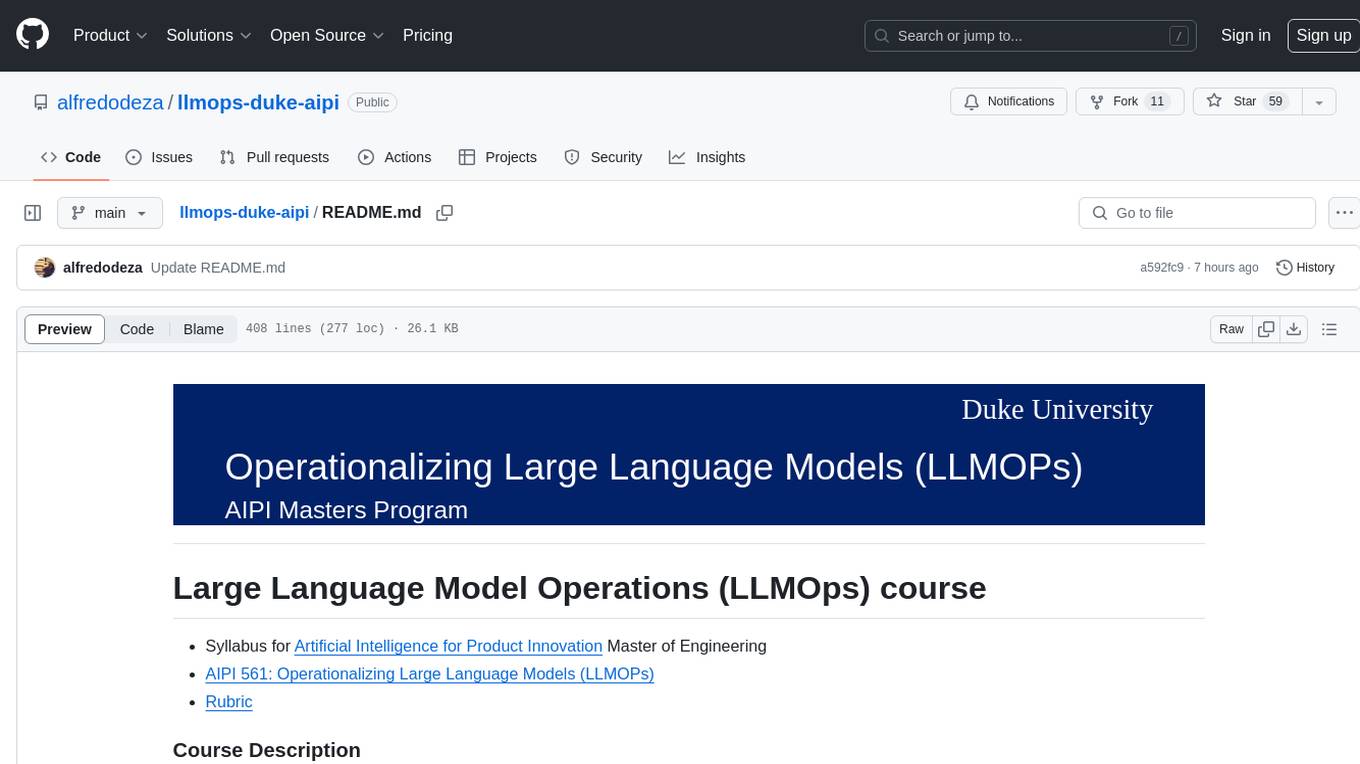
llmops-duke-aipi
LLMOps Duke AIPI is a course focused on operationalizing Large Language Models, teaching methodologies for developing applications using software development best practices with large language models. The course covers various topics such as generative AI concepts, setting up development environments, interacting with large language models, using local large language models, applied solutions with LLMs, extensibility using plugins and functions, retrieval augmented generation, introduction to Python web frameworks for APIs, DevOps principles, deploying machine learning APIs, LLM platforms, and final presentations. Students will learn to build, share, and present portfolios using Github, YouTube, and Linkedin, as well as develop non-linear life-long learning skills. Prerequisites include basic Linux and programming skills, with coursework available in Python or Rust. Additional resources and references are provided for further learning and exploration.
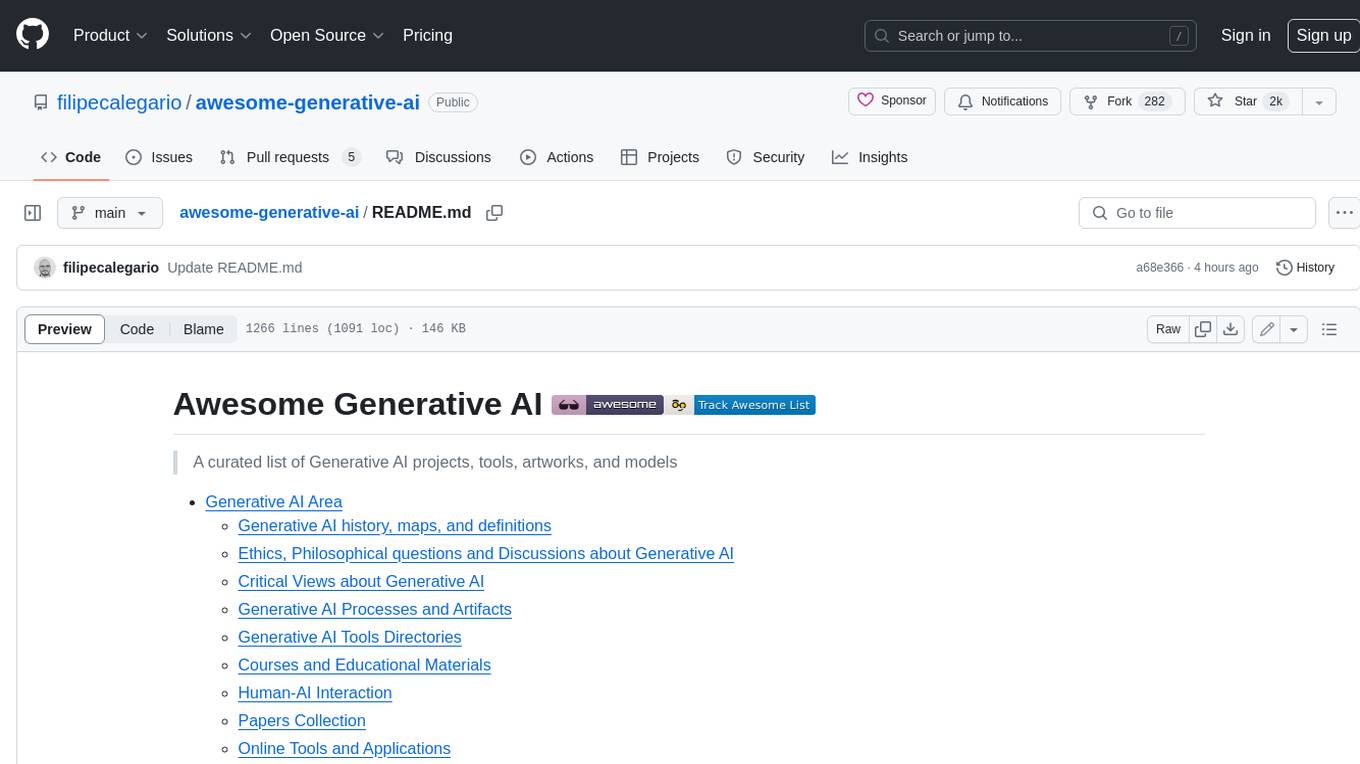
awesome-generative-ai
A curated list of Generative AI projects, tools, artworks, and models
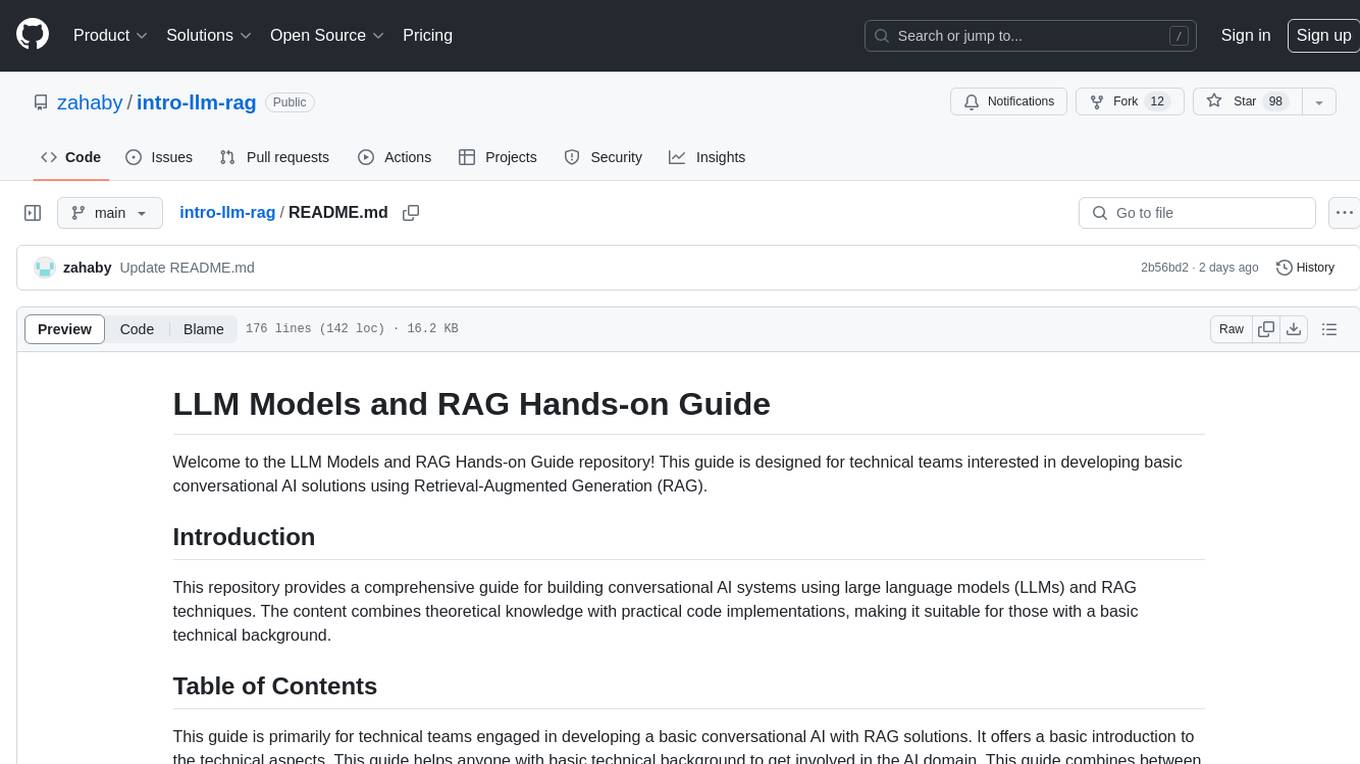
intro-llm-rag
This repository serves as a comprehensive guide for technical teams interested in developing conversational AI solutions using Retrieval-Augmented Generation (RAG) techniques. It covers theoretical knowledge and practical code implementations, making it suitable for individuals with a basic technical background. The content includes information on large language models (LLMs), transformers, prompt engineering, embeddings, vector stores, and various other key concepts related to conversational AI. The repository also provides hands-on examples for two different use cases, along with implementation details and performance analysis.
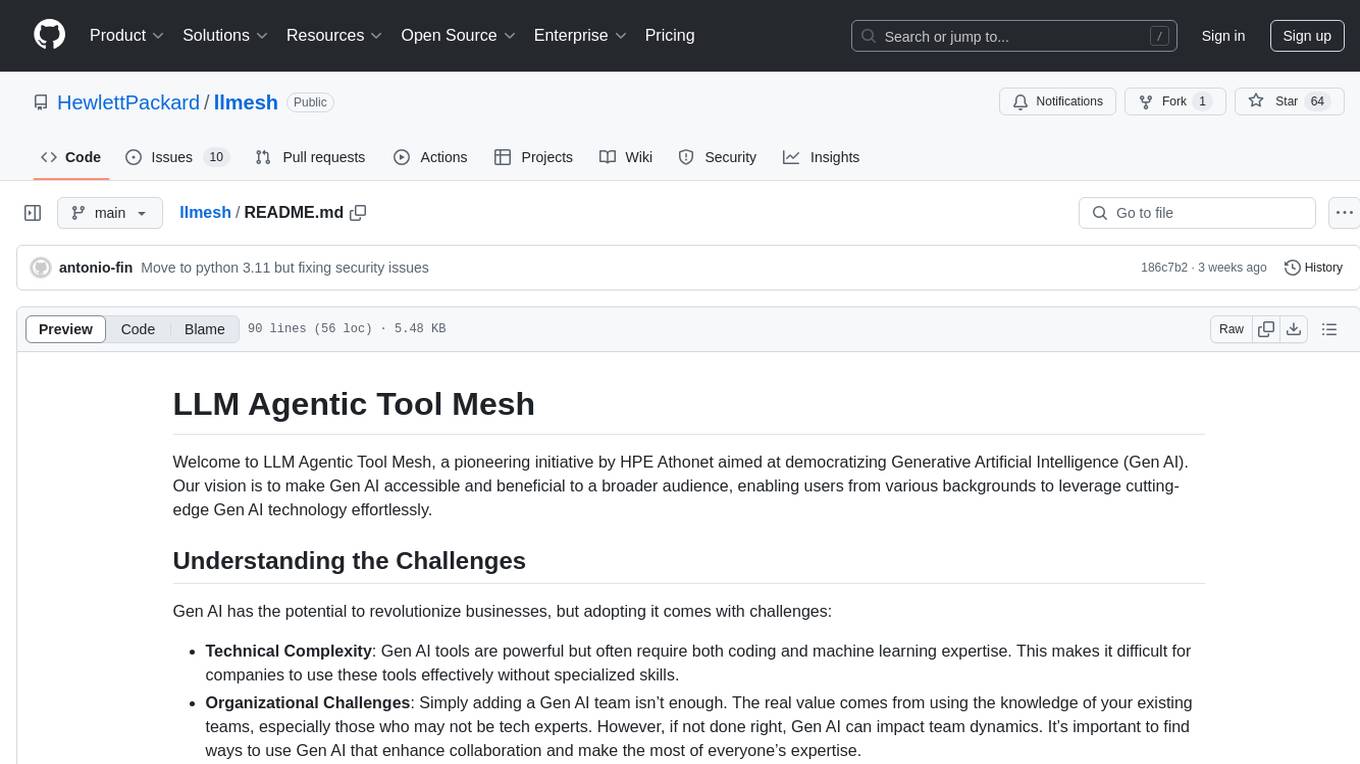
llmesh
LLM Agentic Tool Mesh is a platform by HPE Athonet that democratizes Generative Artificial Intelligence (Gen AI) by enabling users to create tools and web applications using Gen AI with Low or No Coding. The platform simplifies the integration process, focuses on key user needs, and abstracts complex libraries into easy-to-understand services. It empowers both technical and non-technical teams to develop tools related to their expertise and provides orchestration capabilities through an agentic Reasoning Engine based on Large Language Models (LLMs) to ensure seamless tool integration and enhance organizational functionality and efficiency.
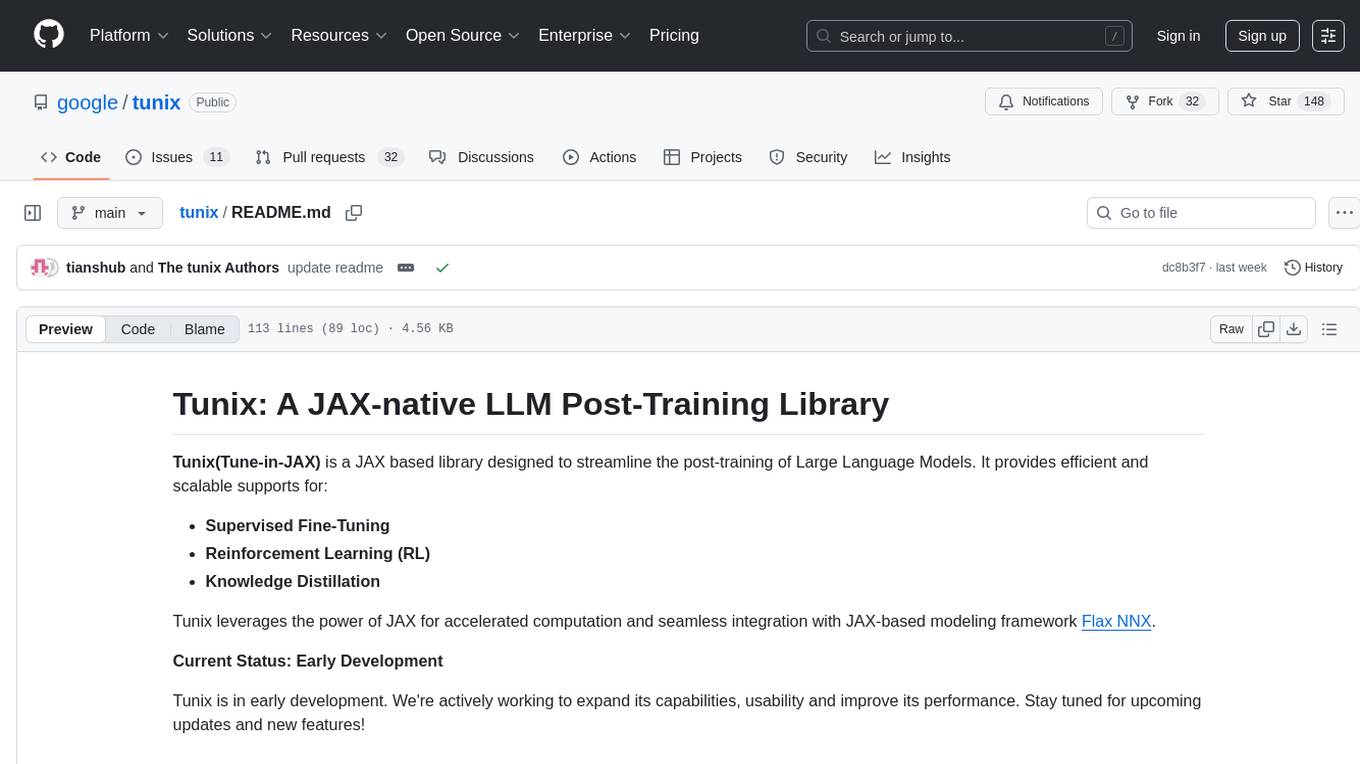
tunix
Tunix is a JAX-based library designed for post-training Large Language Models. It provides efficient support for supervised fine-tuning, reinforcement learning, and knowledge distillation. Tunix leverages JAX for accelerated computation and integrates seamlessly with the Flax NNX modeling framework. The library is modular, efficient, and designed for distributed training on accelerators like TPUs. Currently in early development, Tunix aims to expand its capabilities, usability, and performance.

AgentForge
AgentForge is a low-code framework tailored for the rapid development, testing, and iteration of AI-powered autonomous agents and Cognitive Architectures. It is compatible with a range of LLM models and offers flexibility to run different models for different agents based on specific needs. The framework is designed for seamless extensibility and database-flexibility, making it an ideal playground for various AI projects. AgentForge is a beta-testing ground and future-proof hub for crafting intelligent, model-agnostic autonomous agents.
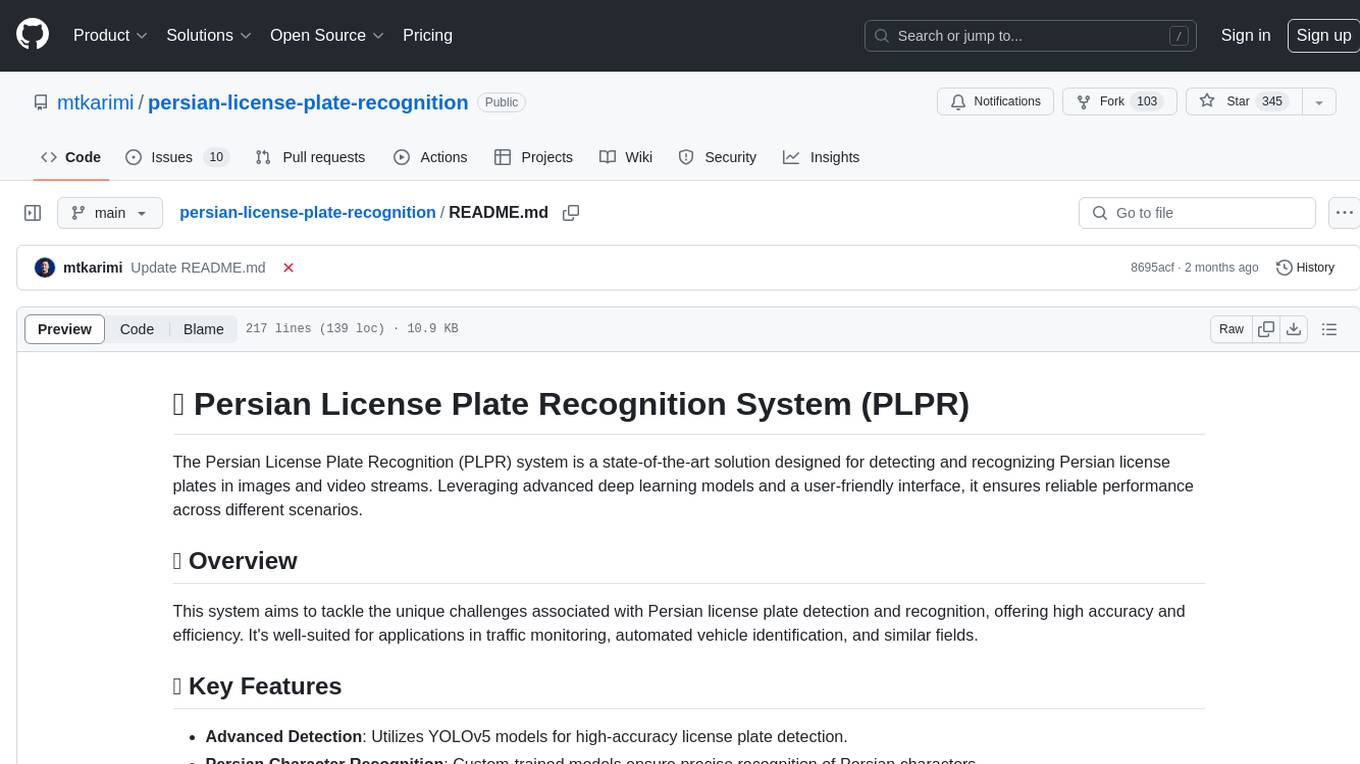
persian-license-plate-recognition
The Persian License Plate Recognition (PLPR) system is a state-of-the-art solution designed for detecting and recognizing Persian license plates in images and video streams. Leveraging advanced deep learning models and a user-friendly interface, it ensures reliable performance across different scenarios. The system offers advanced detection using YOLOv5 models, precise recognition of Persian characters, real-time processing capabilities, and a user-friendly GUI. It is well-suited for applications in traffic monitoring, automated vehicle identification, and similar fields. The system's architecture includes modules for resident management, entrance management, and a detailed flowchart explaining the process from system initialization to displaying results in the GUI. Hardware requirements include an Intel Core i5 processor, 8 GB RAM, a dedicated GPU with at least 4 GB VRAM, and an SSD with 20 GB of free space. The system can be installed by cloning the repository and installing required Python packages. Users can customize the video source for processing and run the application to upload and process images or video streams. The system's GUI allows for parameter adjustments to optimize performance, and the Wiki provides in-depth information on the system's architecture and model training.
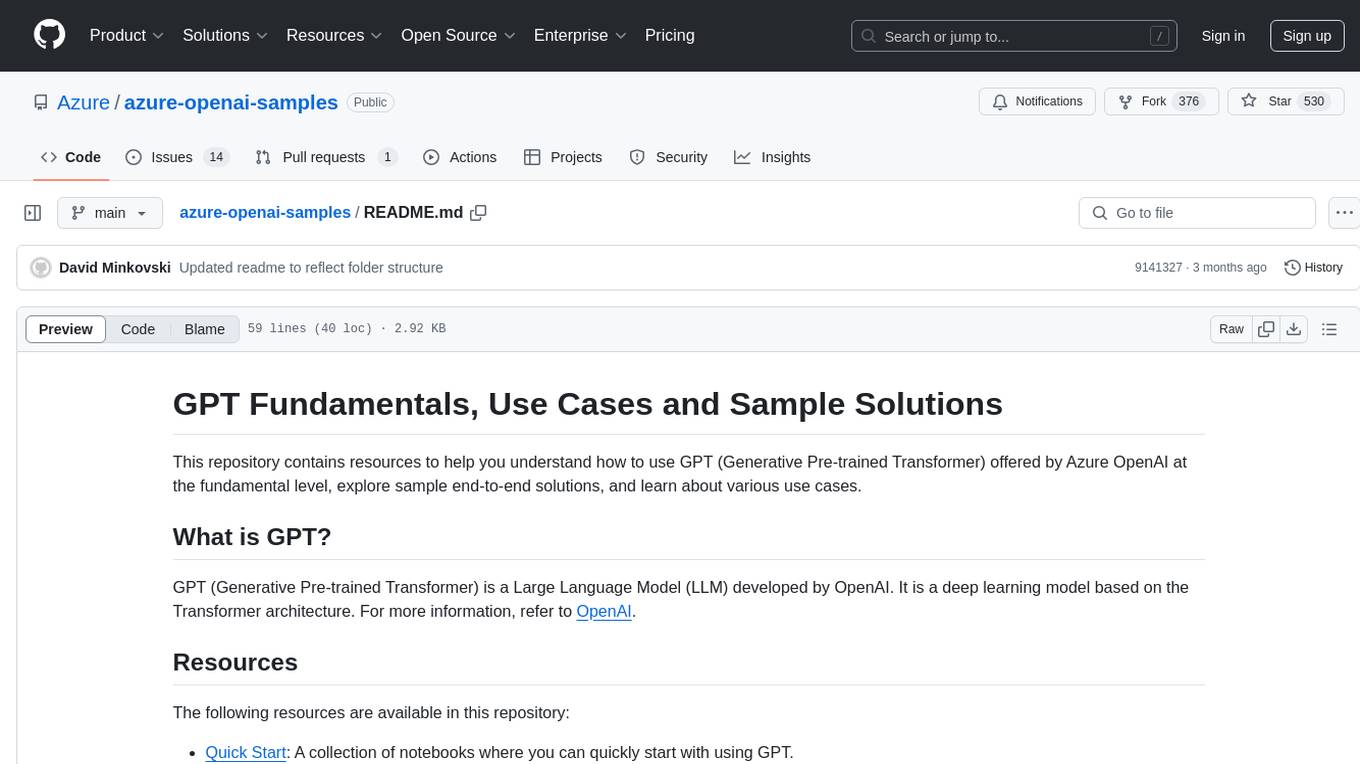
azure-openai-samples
This repository provides resources to understand and utilize GPT (Generative Pre-trained Transformer) by Azure OpenAI. It includes sample solutions, use cases, and quick start guides. Users can explore various applications of GPT, such as chatbots, customer service, and content generation. The repository also offers Langchain, Semantic Kernel, and Prompt Flow samples, along with Serverless SQL GPT for natural language processing in Azure Synapse Analytics. The samples are based on GPT 3.5, with plans to update for GPT-4. Users are encouraged to contribute to keep the repository updated with the latest technologies and solutions.
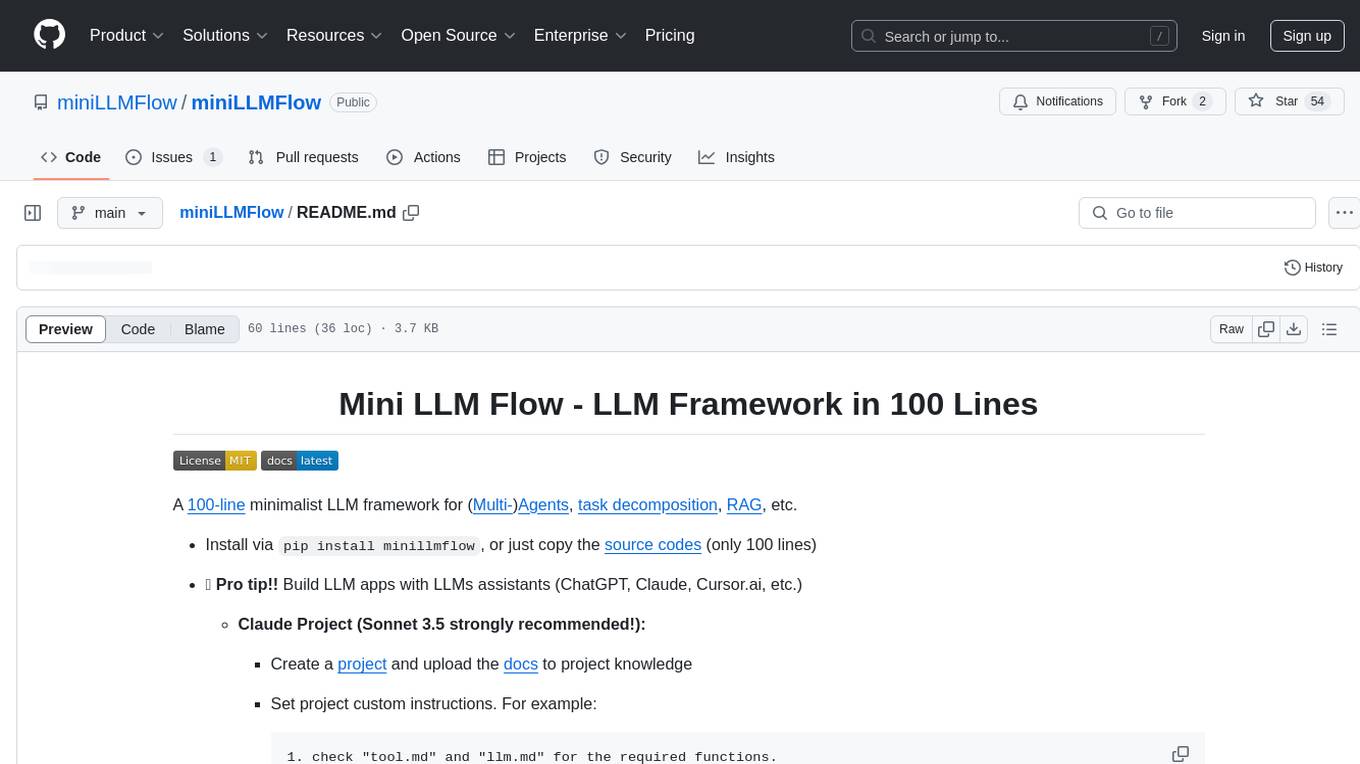
miniLLMFlow
Mini LLM Flow is a 100-line minimalist LLM framework designed for agents, task decomposition, RAG, etc. It aims to be the framework used by LLMs, focusing on high-level programming paradigms while stripping away low-level implementation details. It serves as a learning resource and allows LLMs to design, build, and maintain projects themselves.

ChatFAQ
ChatFAQ is an open-source comprehensive platform for creating a wide variety of chatbots: generic ones, business-trained, or even capable of redirecting requests to human operators. It includes a specialized NLP/NLG engine based on a RAG architecture and customized chat widgets, ensuring a tailored experience for users and avoiding vendor lock-in.
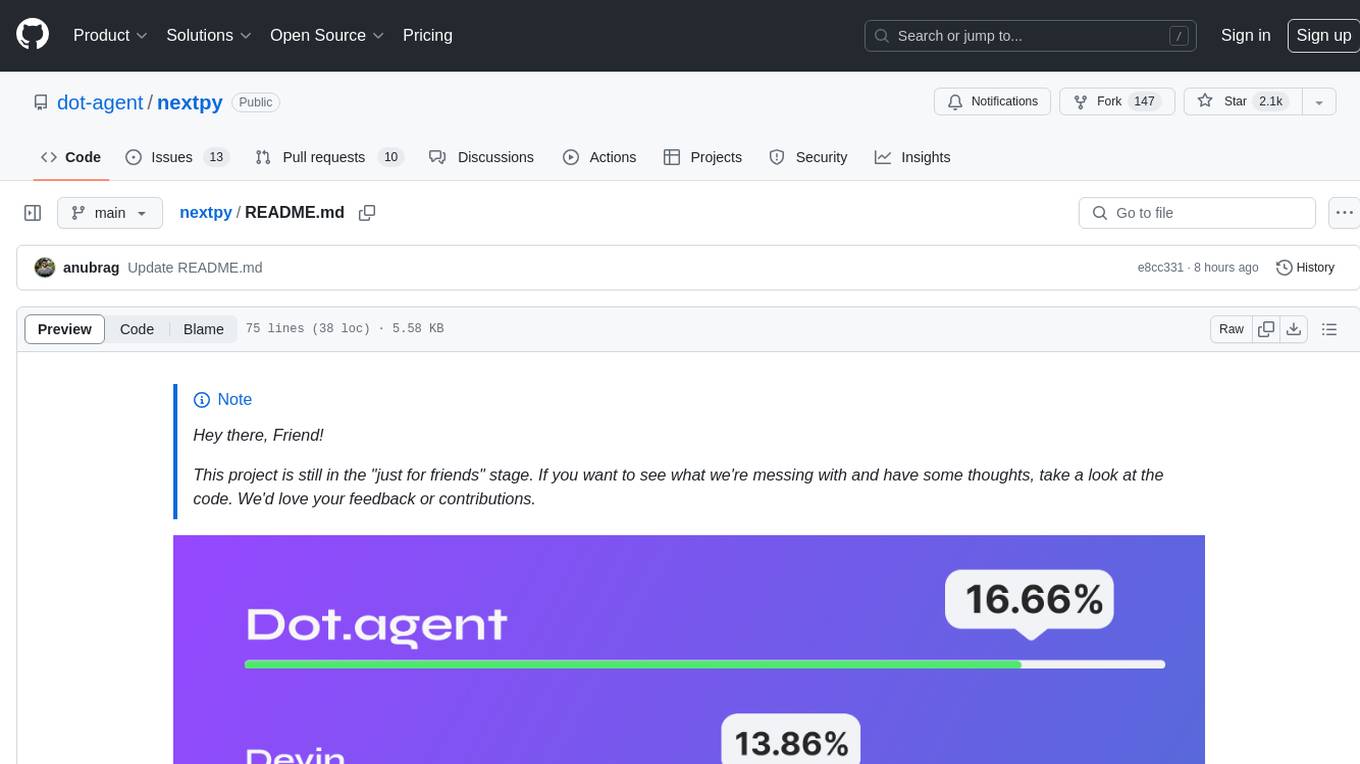
nextpy
Nextpy is a cutting-edge software development framework optimized for AI-based code generation. It provides guardrails for defining AI system boundaries, structured outputs for prompt engineering, a powerful prompt engine for efficient processing, better AI generations with precise output control, modularity for multiplatform and extensible usage, developer-first approach for transferable knowledge, and containerized & scalable deployment options. It offers 4-10x faster performance compared to Streamlit apps, with a focus on cooperation within the open-source community and integration of key components from various projects.
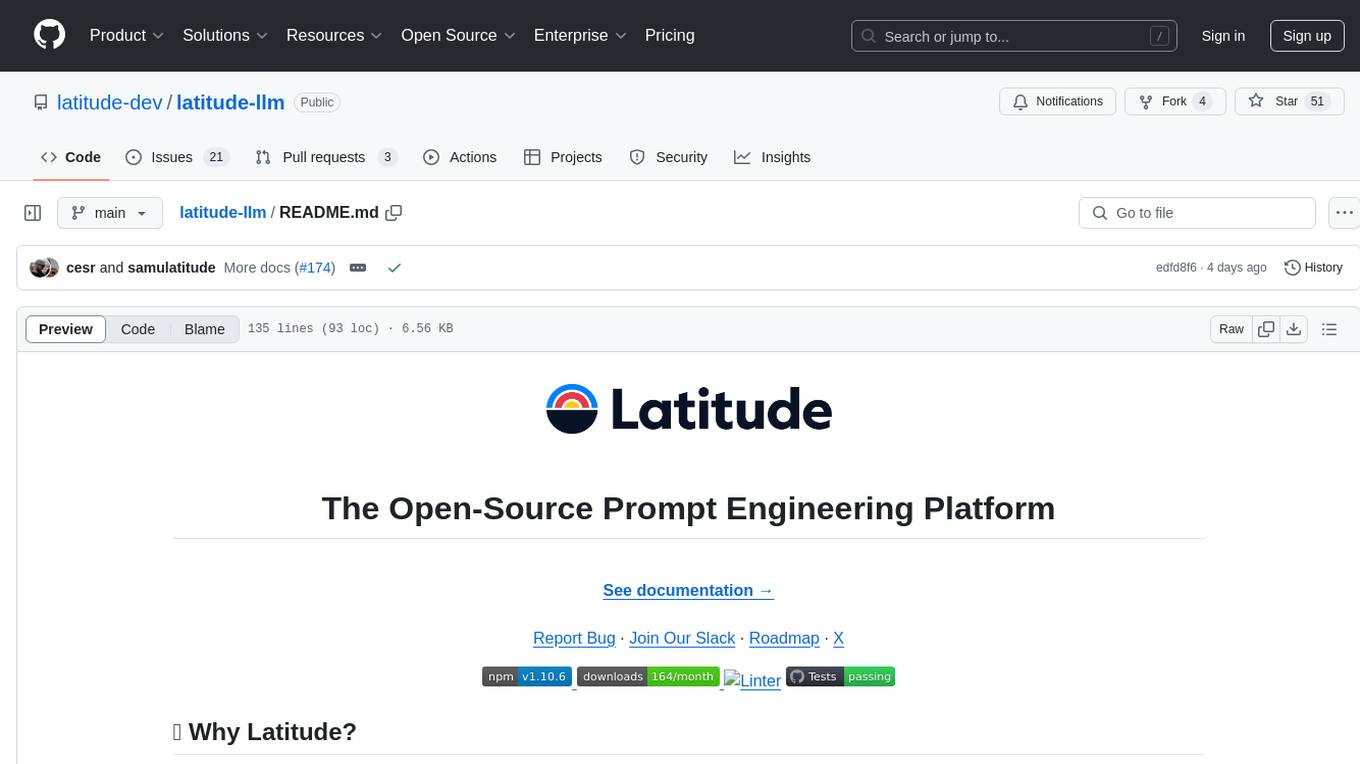
latitude-llm
Latitude is an open-source prompt engineering platform that helps developers and product teams build AI features with confidence. It simplifies prompt management, aids in testing AI responses, and provides detailed analytics on request performance. Latitude offers collaborative prompt management, support for advanced features, version control, API and SDKs for integration, observability, evaluations in batch or real-time, and is community-driven. It can be deployed on Latitude Cloud for a managed solution or self-hosted for control and customization.
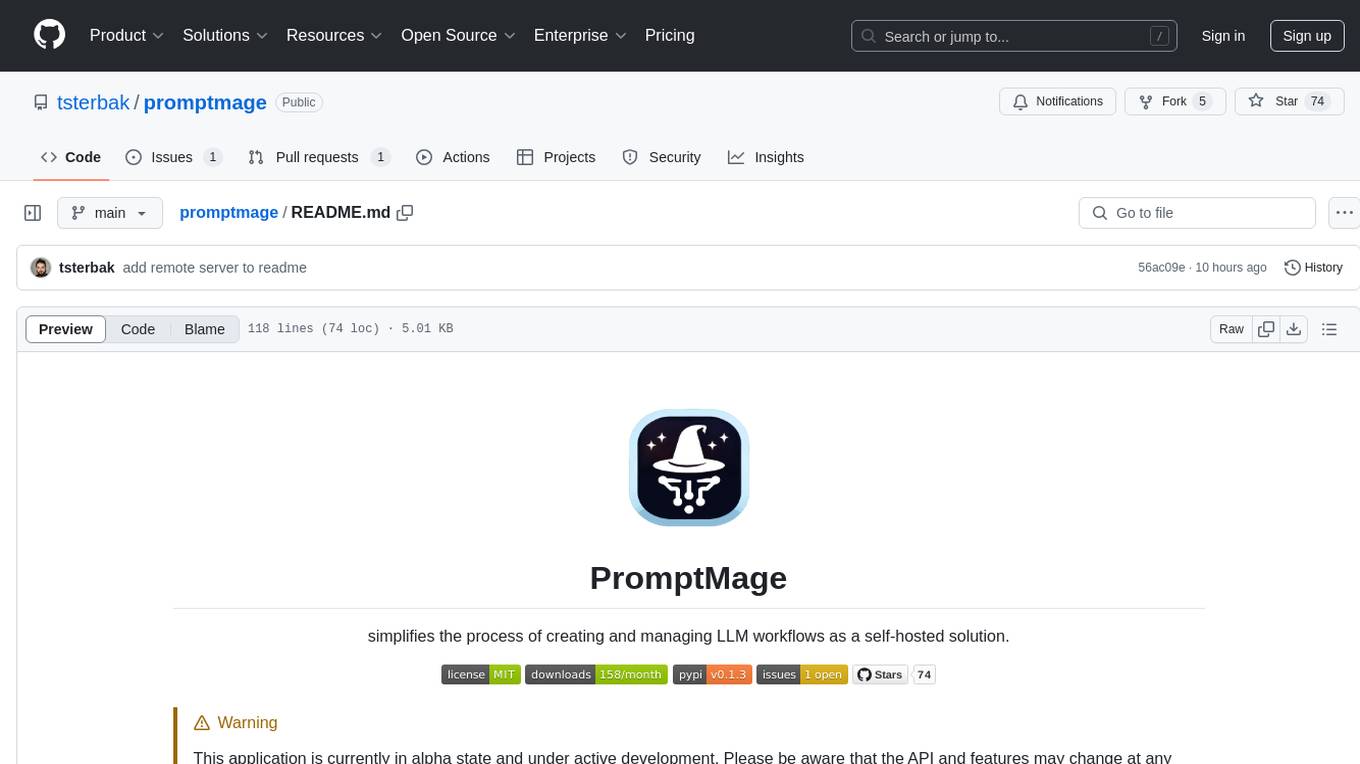
promptmage
PromptMage simplifies the process of creating and managing LLM workflows as a self-hosted solution. It offers an intuitive interface for prompt testing and comparison, incorporates version control features, and aims to improve productivity in both small teams and large enterprises. The tool bridges the gap in LLM workflow management, empowering developers, researchers, and organizations to make LLM technology more accessible and manageable for the next wave of AI innovations.
For similar tasks

awesome-gpt-prompt-engineering
Awesome GPT Prompt Engineering is a curated list of resources, tools, and shiny things for GPT prompt engineering. It includes roadmaps, guides, techniques, prompt collections, papers, books, communities, prompt generators, Auto-GPT related tools, prompt injection information, ChatGPT plug-ins, prompt engineering job offers, and AI links directories. The repository aims to provide a comprehensive guide for prompt engineering enthusiasts, covering various aspects of working with GPT models and improving communication with AI tools.
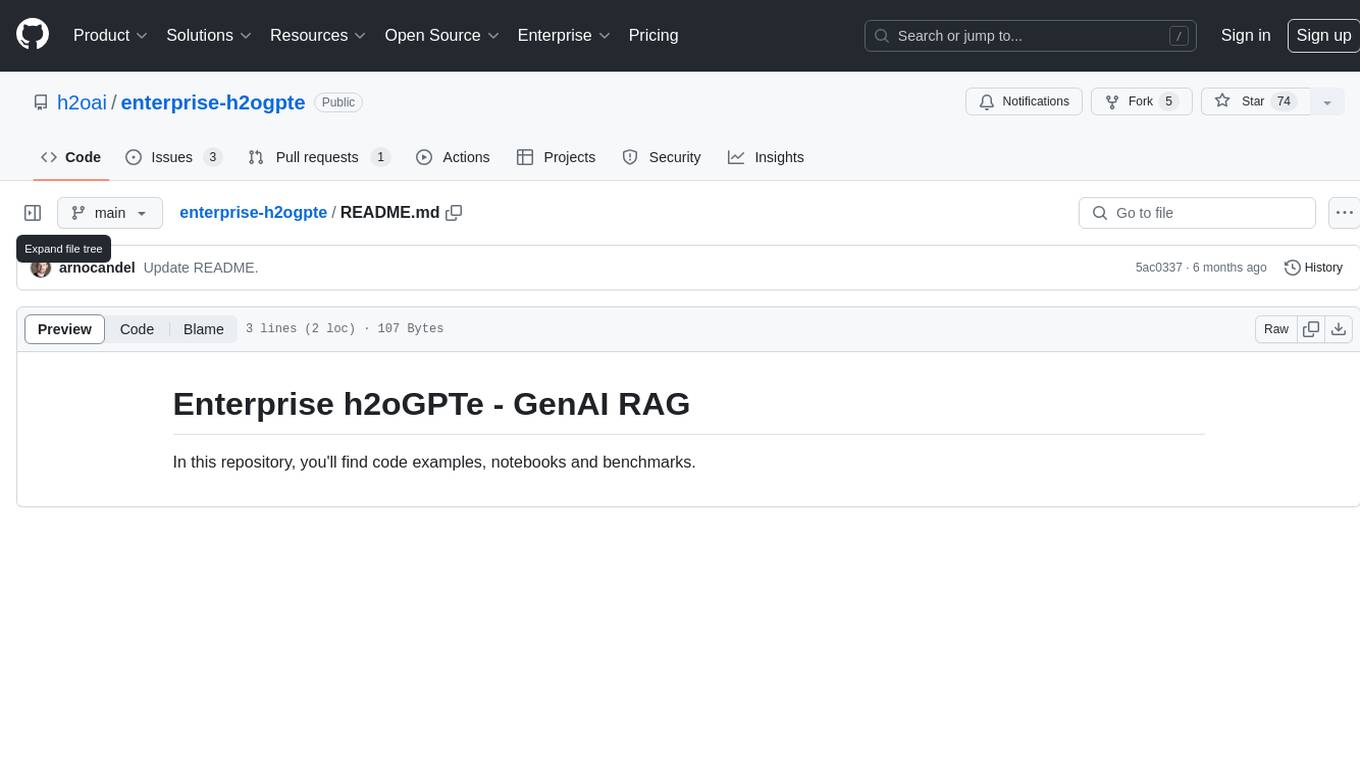
enterprise-h2ogpte
Enterprise h2oGPTe - GenAI RAG is a repository containing code examples, notebooks, and benchmarks for the enterprise version of h2oGPTe, a powerful AI tool for generating text based on the RAG (Retrieval-Augmented Generation) architecture. The repository provides resources for leveraging h2oGPTe in enterprise settings, including implementation guides, performance evaluations, and best practices. Users can explore various applications of h2oGPTe in natural language processing tasks, such as text generation, content creation, and conversational AI.
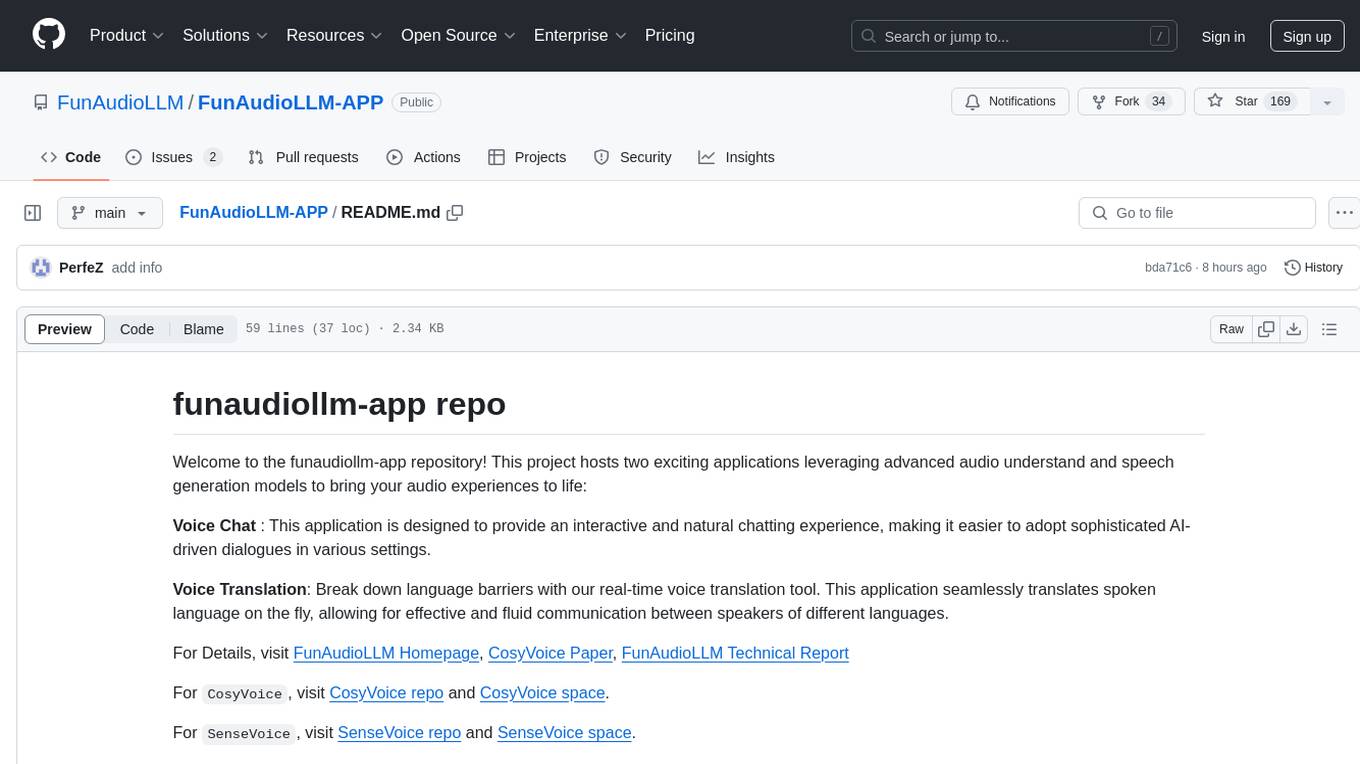
FunAudioLLM-APP
FunAudioLLM-APP is a repository hosting two applications: Voice Chat for interactive AI-driven dialogues and Voice Translation for real-time language translation. The project leverages advanced audio understanding and speech generation models to enhance audio experiences. Users can visit the FunAudioLLM Homepage, CosyVoice Paper, and FunAudioLLM Technical Report for more details. The applications aim to break down language barriers and provide a natural chatting experience in various settings.
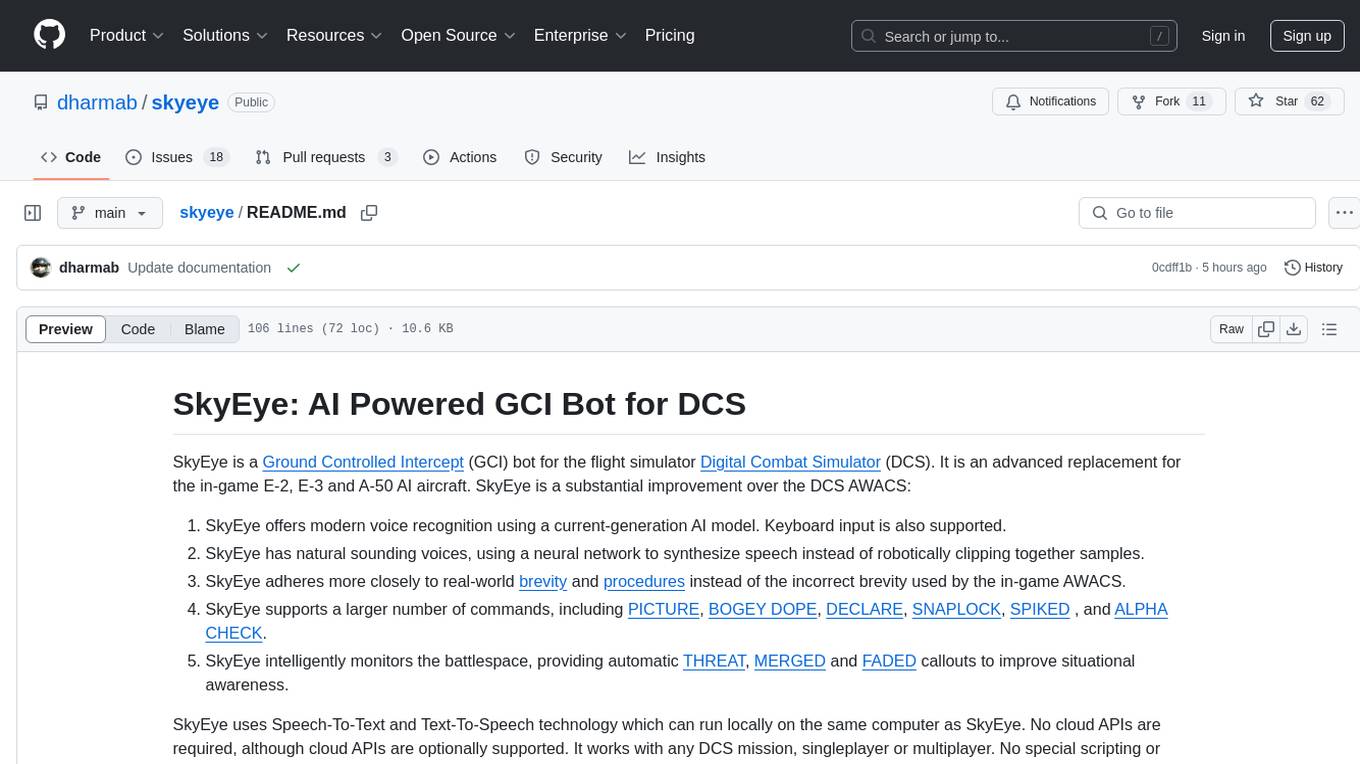
skyeye
SkyEye is an AI-powered Ground Controlled Intercept (GCI) bot designed for the flight simulator Digital Combat Simulator (DCS). It serves as an advanced replacement for the in-game E-2, E-3, and A-50 AI aircraft, offering modern voice recognition, natural-sounding voices, real-world brevity and procedures, a wide range of commands, and intelligent battlespace monitoring. The tool uses Speech-To-Text and Text-To-Speech technology, can run locally or on a cloud server, and is production-ready software used by various DCS communities.
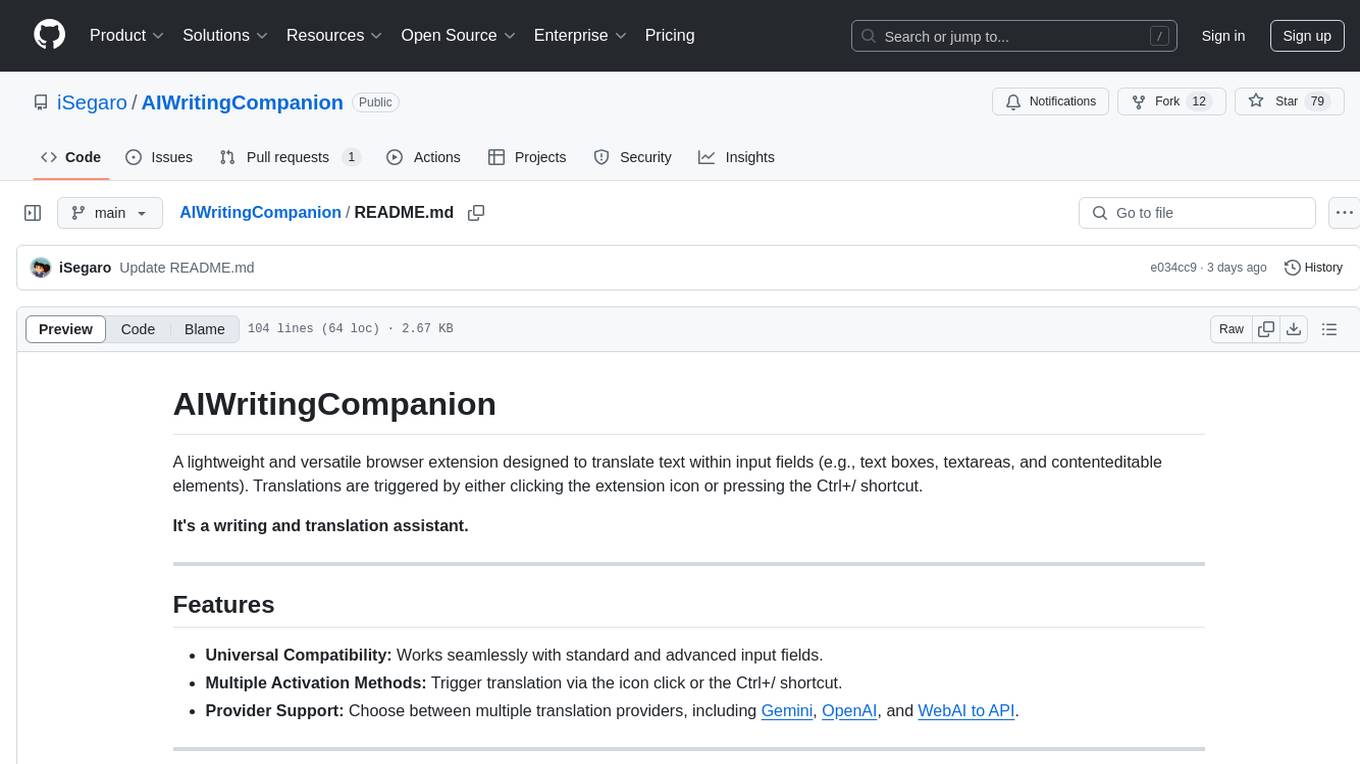
AIWritingCompanion
AIWritingCompanion is a lightweight and versatile browser extension designed to translate text within input fields. It offers universal compatibility, multiple activation methods, and support for various translation providers like Gemini, OpenAI, and WebAI to API. Users can install it via CRX file or Git, set API key, and use it for automatic translation or via shortcut. The tool is suitable for writers, translators, students, researchers, and bloggers. AI keywords include writing assistant, translation tool, browser extension, language translation, and text translator. Users can use it for tasks like translate text, assist in writing, simplify content, check language accuracy, and enhance communication.
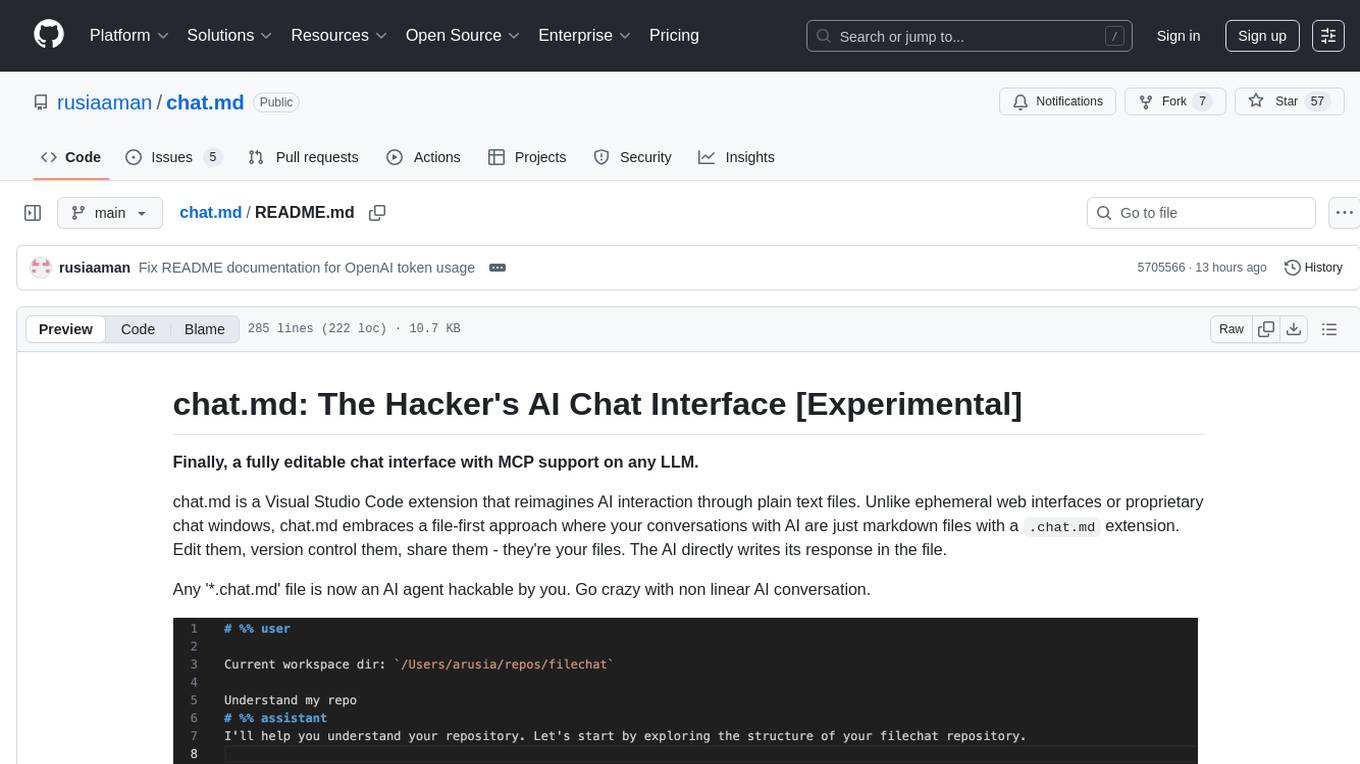
chat.md
This repository contains a chatbot tool that utilizes natural language processing to interact with users. The tool is designed to understand and respond to user input in a conversational manner, providing information and assistance. It can be integrated into various applications to enhance user experience and automate customer support. The chatbot tool is user-friendly and customizable, making it suitable for businesses looking to improve customer engagement and streamline communication.
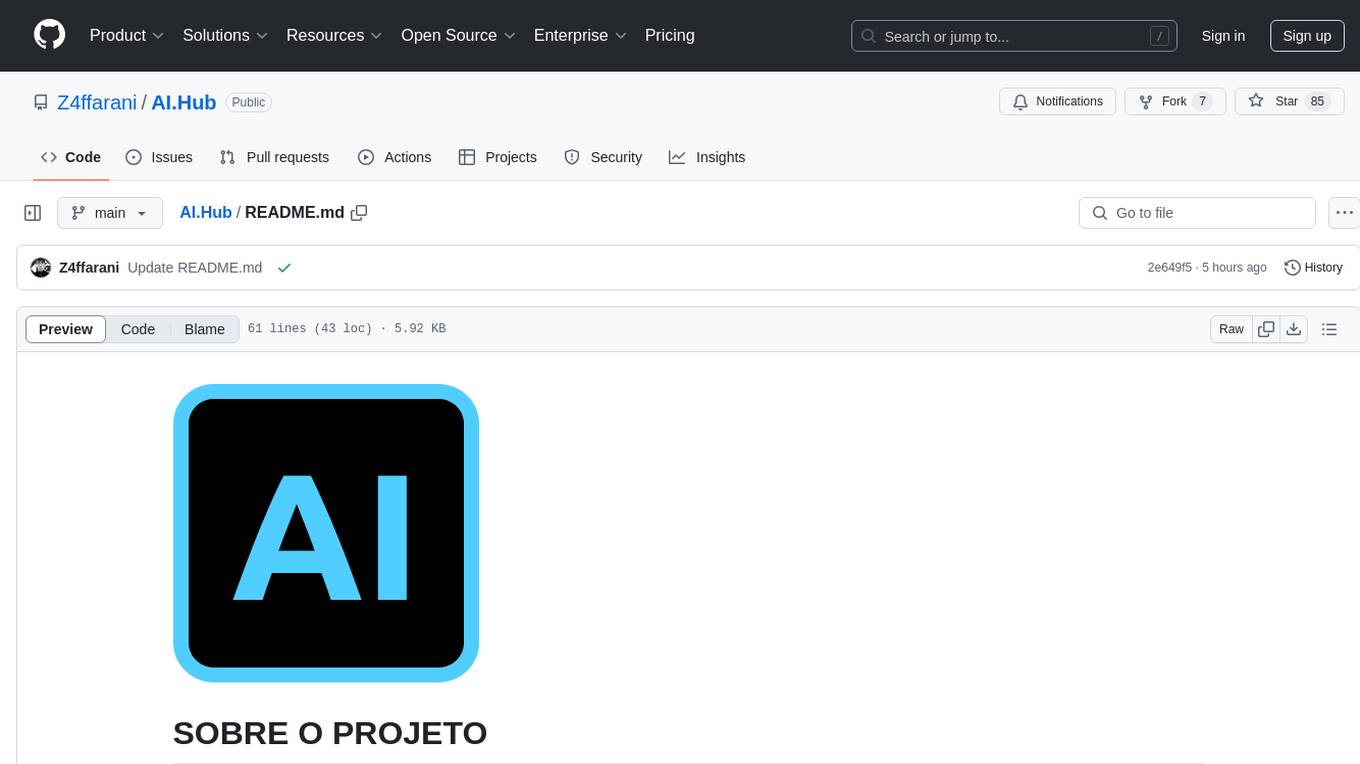
AI.Hub
AI.Hub is a website displaying cards with artificial intelligences (AIs) for various applications, developed using HTML, CSS, and JavaScript. The site aims to democratize access to disruptive AIs by categorizing and organizing them dynamically. It features a responsive layout, search bar for filtering AIs, interactive cards, and column expansion on mobile devices. The project promotes innovation and helps users explore the potential of new technologies.
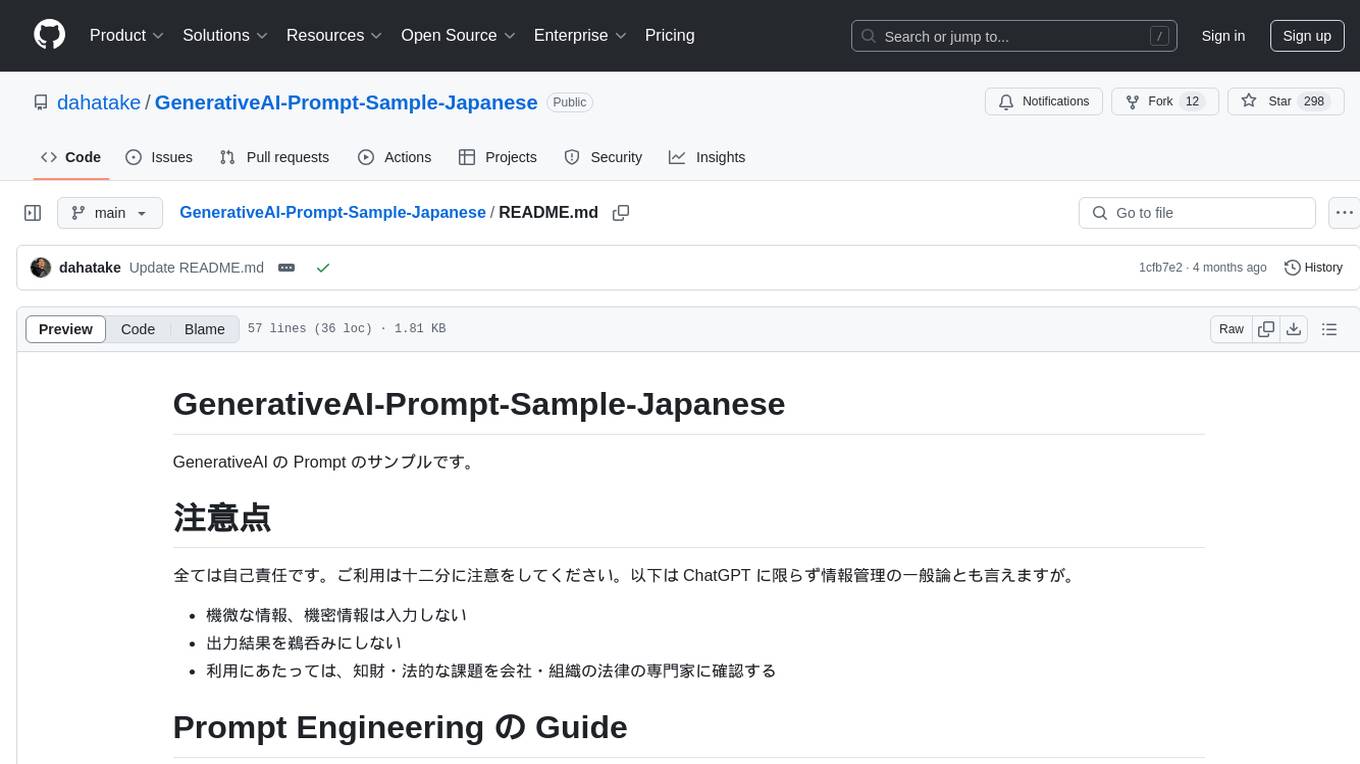
GenerativeAI-Prompt-Sample-Japanese
This repository provides sample prompts for GenerativeAI in Japanese. Users should exercise caution and not input sensitive information. The included tools are Microsoft Copilot, OpenAI, Azure OpenAI Service, and Prompt Engineering Basic. The repository also offers a guide for Prompt Engineering in Japanese, along with references to various Japanese examples of Prompt Engineering techniques.
For similar jobs

sweep
Sweep is an AI junior developer that turns bugs and feature requests into code changes. It automatically handles developer experience improvements like adding type hints and improving test coverage.

teams-ai
The Teams AI Library is a software development kit (SDK) that helps developers create bots that can interact with Teams and Microsoft 365 applications. It is built on top of the Bot Framework SDK and simplifies the process of developing bots that interact with Teams' artificial intelligence capabilities. The SDK is available for JavaScript/TypeScript, .NET, and Python.

ai-guide
This guide is dedicated to Large Language Models (LLMs) that you can run on your home computer. It assumes your PC is a lower-end, non-gaming setup.

classifai
Supercharge WordPress Content Workflows and Engagement with Artificial Intelligence. Tap into leading cloud-based services like OpenAI, Microsoft Azure AI, Google Gemini and IBM Watson to augment your WordPress-powered websites. Publish content faster while improving SEO performance and increasing audience engagement. ClassifAI integrates Artificial Intelligence and Machine Learning technologies to lighten your workload and eliminate tedious tasks, giving you more time to create original content that matters.

chatbot-ui
Chatbot UI is an open-source AI chat app that allows users to create and deploy their own AI chatbots. It is easy to use and can be customized to fit any need. Chatbot UI is perfect for businesses, developers, and anyone who wants to create a chatbot.

BricksLLM
BricksLLM is a cloud native AI gateway written in Go. Currently, it provides native support for OpenAI, Anthropic, Azure OpenAI and vLLM. BricksLLM aims to provide enterprise level infrastructure that can power any LLM production use cases. Here are some use cases for BricksLLM: * Set LLM usage limits for users on different pricing tiers * Track LLM usage on a per user and per organization basis * Block or redact requests containing PIIs * Improve LLM reliability with failovers, retries and caching * Distribute API keys with rate limits and cost limits for internal development/production use cases * Distribute API keys with rate limits and cost limits for students

uAgents
uAgents is a Python library developed by Fetch.ai that allows for the creation of autonomous AI agents. These agents can perform various tasks on a schedule or take action on various events. uAgents are easy to create and manage, and they are connected to a fast-growing network of other uAgents. They are also secure, with cryptographically secured messages and wallets.

griptape
Griptape is a modular Python framework for building AI-powered applications that securely connect to your enterprise data and APIs. It offers developers the ability to maintain control and flexibility at every step. Griptape's core components include Structures (Agents, Pipelines, and Workflows), Tasks, Tools, Memory (Conversation Memory, Task Memory, and Meta Memory), Drivers (Prompt and Embedding Drivers, Vector Store Drivers, Image Generation Drivers, Image Query Drivers, SQL Drivers, Web Scraper Drivers, and Conversation Memory Drivers), Engines (Query Engines, Extraction Engines, Summary Engines, Image Generation Engines, and Image Query Engines), and additional components (Rulesets, Loaders, Artifacts, Chunkers, and Tokenizers). Griptape enables developers to create AI-powered applications with ease and efficiency.
